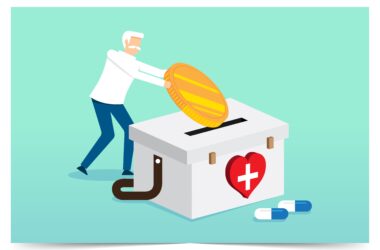Nature reports that in a study evaluating moral distress and burnout in internal medicine residents, burnout rates for these professionals ranged from 27% to 75% across various medical subspecialties. This isn’t surprising. The dedication and compassion medical residents or any healthcare professionals possess are truly remarkable, but the demanding nature of the job can take a significant toll on their emotional well-being. So, how can you, as a healthcare worker, navigate the daily pressures and emerge stronger? The answer lies in strengthening emotional resilience.
This blog will equip you with practical self-care strategies to cultivate self-awareness, build emotional resilience, and ultimately find a sense of balance in your challenging career.
Why Does Self-Awareness Matters?
Self-awareness is the building block for strengthening emotional resilience. It’s about understanding your stress triggers, recognizing your emotions, and accepting & appreciating your strengths and limitations. By becoming more self-aware, you can foresee challenging situations and develop coping mechanisms to navigate them effectively.
Here’s how to elevate your self-awareness:
- Practice Mindfulness: Mindfulness includes paying attention to the current moment without judgment. Techniques like meditation or mindful breathing can help you become more aware of your thoughts and feelings.
- Journaling: Though a simple habit, regularly journaling allows you to explore your emotions and identify recurring patterns. Penning down your thoughts and feelings can offer valuable insights into your stress triggers and coping mechanisms.
- Seek Feedback: Ask trusted colleagues or mentors for honest feedback on your performance. This can highlight areas where you excel and aspects that might be contributing to stress.
Practical Strategies To Build Emotional Resilience
Emotional resilience is the ability to rebound from challenges and adapt to stressful situations. By building these skills, you can better manage the emotional demands of your role. Here are some practices to enhance your emotional resilience:
- Set Boundaries: Saying no to additional tasks when you’re already overloaded is crucial. It is imperative to establish clear work-life boundaries and stick to them. Protect your personal time for rest and rejuvenation.
- Develop Healthy Coping Mechanisms: Find healthy outlets for stress, such as exercise, spending time in nature, listening to calming music, or pursuing hobbies you enjoy.
- Practice Self-Compassion: Be kind to yourself. Don’t beat yourself up for mistakes. Recognize that you’re human and acknowledge your efforts, even when its hard to accept the fact.
- Seek Social Support: Connect with loved ones, colleagues, or support groups for healthcare professionals. Having a strong social network provides a sense of belonging and an invaluable source of emotional support.
Building Stronger Connections With Social Awareness
Along with self-awareness, social awareness is essential. Strong relationships with colleagues and patients is crucial for building a supportive and positive work environment. Social awareness, a critical component of emotional intelligence, plays a vital role in this. Here’s how social awareness can elevate your well-being as a healthcare worker:
- Understanding Patient Needs: By actively listening to your patients and acknowledging their concerns, you can build rapport and trust, leading to better treatment outcomes and a more positive patient experience.
- Empathy For Colleagues: Recognizing the stress your colleagues might be facing and offering support can create a sense of camaraderie and shared purpose, stimulating a more collaborative and supportive work environment.
- Effective Communication: Social awareness allows you to tailor your communication style to different personalities, ensuring clear and concise information exchange with both patients and colleagues. This reduces misunderstandings and promotes a smoother workflow.
Healthcare Solutions – Supporting Your Well-Being
Many healthcare institutions are identifying the importance of employee well-being and are offering resources to support their staff. Explore what resources your workplace offers, such as:
- Employee Assistance Programs (EAPs): These programs offer comforting & confidential counseling and support services to help you understand and address stress, anxiety, and other mental health concerns.
- Wellness Programs: These programs might offer yoga classes, meditation sessions, or fitness challenges, all designed to stimulate your physical and mental health and overall well-being.
- Flexible Work Arrangements: Discuss flexible work options with your supervisor. A flexible schedule can help create a better work-life balance, alleviating stress and improving job satisfaction.
By prioritizing self-care, boosting your self-awareness, and strengthening emotional resilience, you can become a more empowered and effective healthcare provider. Investing in your well-being will not only benefit you but also positively impact the quality of care you deliver to your patients.
Promoting Collaboration And Support With Relationship Management
While self-care strategies are essential, building solid relationships with colleagues and supervisors can significantly enhance your well-being. Having a supportive network within your workplace can provide a sense of belonging, lower stress, and boost job satisfaction. Here are ways to nurture positive relationships at work:
- Express Appreciation: Take time to acknowledge the contributions of your colleagues, both verbally and through written notes.
- Offer Help: Be willing to lend a supportive hand to colleagues who are overwhelmed. This fosters a sense of reciprocity and builds trust.
- Maintain Clear Communication: Open and honest communication is essential for resolving conflicts and maintaining positive working relationships.
- Participate In Team-Building Activities: Engaging in activities outside of work can help you connect with colleagues on a personal level and strengthen team spirit.
By taking these steps, you can cultivate positive relationships with those you work with, creating a more supportive and collaborative environment. This sense of community fosters resilience and helps you navigate challenges more effectively.
Taking Action Today
Start by including small changes in your daily routine. Perhaps dedicate 10 minutes each morning to mindfulness meditation or schedule a weekly walk with a friend. Remember, strengthening emotional resilience is a journey, not a destination. Be patient with yourself and celebrate your progress along the way.
Additional Resources:
The National Alliance on Mental Illness (NAMI): https://www.nami.org/
The American Psychological Association (APA): https://www.apa.org/
The Jed Foundation: https://jedfoundation.org/
By using the strategies outlined above and seeking additional support when needed, you can become a more resilient and well-balanced healthcare professional, ready to face any challenge with strength and compassion.
[Related Blog: Understanding Mental Health’s Impact On Healthcare Workers And Patients]












